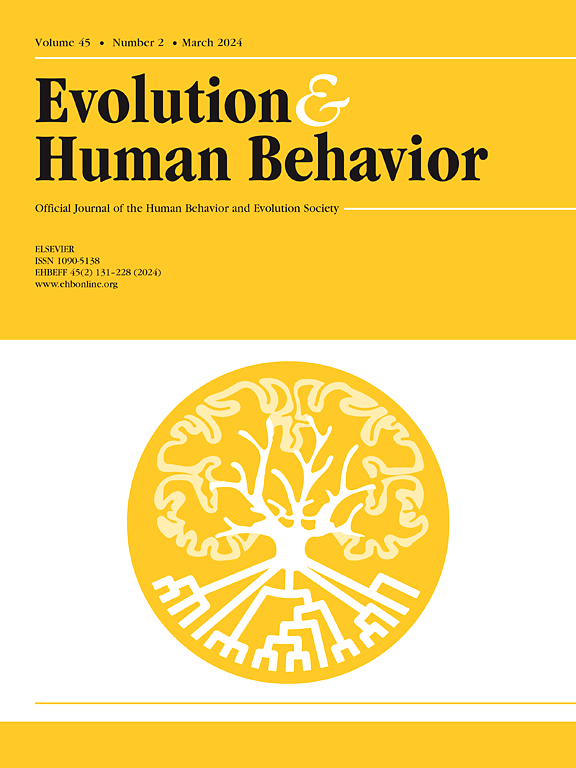财富还是慷慨?人们选择伴侣的依据是变化更大的一方
IF 3.2
1区 心理学
Q1 BEHAVIORAL SCIENCES
引用次数: 0
摘要
有机体通过选择愿意并能够为其提供利益的伴侣而受益(例如,根据温暖、能力、财富进行选择)。但是他们应该更喜欢哪个伴侣——意愿还是能力?我们测试了这样一个假设,即人们会把注意力集中在别人身上变化更大的特征上:一种特征的差异越大,“最好”和“最差”之间的差异就越大,所以这种特征对选择者的影响就越大(其他条件相同)。在两项研究中,参与者看到了一系列假想的分配金钱任务的伙伴,这些伙伴要么在他们必须分配的钱的数量(不平等财富条件)上变化更大,要么在他们捐出的钱的百分比上变化更大(不平等慷慨条件)。参与者默认倾向于了解他人的慷慨程度,而不是他们的财富;当其他人的慷慨程度变化更大时,这种偏好就会加强,而当其他人的财富变化更大时,这种偏好就会减弱。因此,我们的研究表明,人们对某一特征的群体差异非常敏感,并灵活地调整他们的伴侣偏好,以关注其他特征中差异较大的特征。本文章由计算机程序翻译,如有差异,请以英文原文为准。
Wealth or generosity? People choose partners based on whichever is more variable
Organisms benefit from choosing partners who are willing and able to provide them with benefits (e.g., choose based on warmth, competence, wealth). But which should they prefer in a partner – willingness or abilities? We tested the hypothesis that people will focus on whichever trait is more variable in others: the more variance there is in a trait, the greater the difference there is between the “best” and “worst”, so the more that trait will impact the chooser (all else equal). In two studies, participants saw a range of partners for a hypothetical money distribution task who either varied more in the amount of money they had to distribute (Unequal Wealth condition) or in the percent of their money they gave away (Unequal Generosity condition). Participants had a default preference to know about others' generosity rather than their wealth; this preference was strengthened when others varied more in generosity and weakened when others varied more in wealth. Thus, our study shows that people are sensitive to the amount of population variance on a trait, and flexibly adjust their partner preferences to focus on traits which vary more among others.
求助全文
通过发布文献求助,成功后即可免费获取论文全文。
去求助
来源期刊

Evolution and Human Behavior
生物-行为科学
CiteScore
8.30
自引率
9.80%
发文量
62
审稿时长
82 days
期刊介绍:
Evolution and Human Behavior is an interdisciplinary journal, presenting research reports and theory in which evolutionary perspectives are brought to bear on the study of human behavior. It is primarily a scientific journal, but submissions from scholars in the humanities are also encouraged. Papers reporting on theoretical and empirical work on other species will be welcome if their relevance to the human animal is apparent.
 求助内容:
求助内容: 应助结果提醒方式:
应助结果提醒方式:


